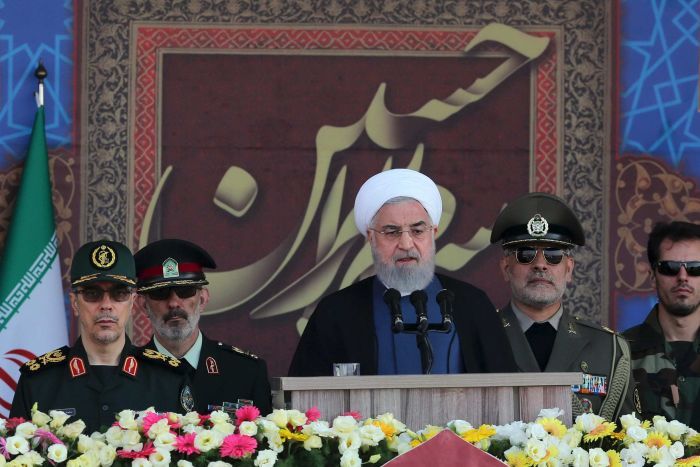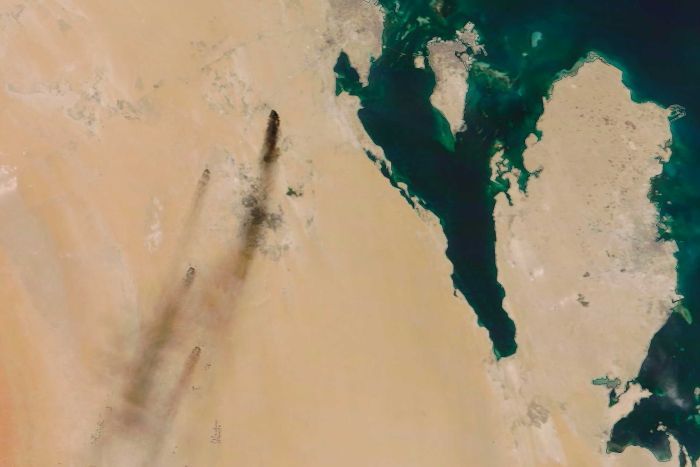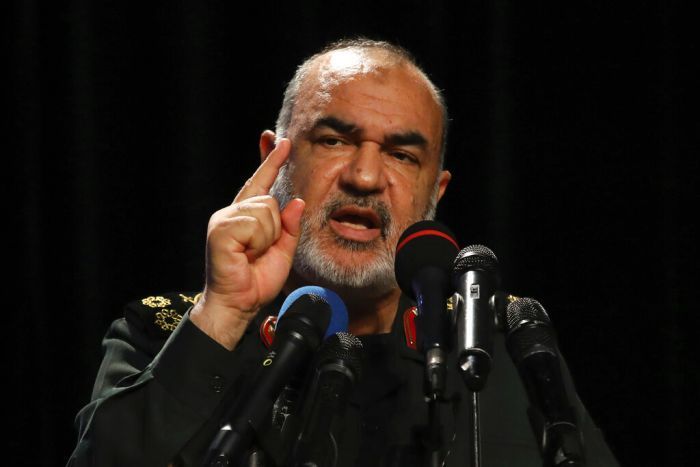
Iranian President calls on the US to leave the Persian Gulf as tensions rise
Updated

Photo:
Iranian President Hassan Rouhani said the US’s presence in the region had always been a calamity. (AP)
picIran’s President has criticised a US-led coalition patrolling the Persian Gulf, calling for Western powers to leave the security of the area to regional nations led by Tehran.
Key points:
- The US will deploy more troops to Saudi Arabia and the UAE after attacks on oil assets
- Washington blames Iran for the attacks on Saudi oil infrastructure, which Tehran denies
- Iran’s Revolutionary Guard has carried out war exercises and is “ready for any scenario”
President Hassan Rouhani promised to unveil a regional peace plan at this week’s upcoming high-level meetings at the United Nations, which comes amid heightened Mideast tensions.
Washington blames Tehran for the September 14 attacks that knocked out half of Saudi Arabia’s total oil production — or about 6 per cent of the world’s oil supply — despite Yemen’s Iranian-backed Houthi rebels officially claiming responsibility.
Saudi Arabia says the attack was “unquestionably sponsored by Iran.”
Iran denies being responsible and has warned any retaliatory attack targeting it will result in an “all-out war.”
That’s as it has begun enriching uranium beyond the terms of its 2015 nuclear deal with world powers, which the US unilaterally withdrew from over a year earlier.
US told to ‘distance’ itself from the region
Mr Rouhani spoke at a military parade in Tehran held for Holy Defence Week, which marks the start of the Iran-Iraq war in 1980.
He said Iran was willing to “extend the hand of friendship and brotherhood” to Persian Gulf nations and was “even ready to forgive their past mistakes.”
“Those who want to link the region’s incidents to the Islamic Republic of Iran are lying like their past lies that have been revealed,” he said.
“If they are truthful and really seek security in the region, they must not send weapons, fighter jets, bombs and dangerous arms to the region.”
Mr Rouhani added that the US and Western nations should “distance” themselves from the region.
“Your presence has always been a calamity for this region and the farther you go from our region and our nations, the more security would come for our region,” he said.
He said Iran’s plan would focus on providing security in the Persian Gulf, the Strait of Hormuz and the Gulf of Oman “with help from regional countries.”

Photo:
The head of Iran’s Revolutionary Guard said his forces have carried out “war exercises”. (Reuters)
Iran has boosted its naval cooperation with China, India, Oman, Pakistan, and Russia in recent years.
The US maintains defence agreements across the Persian Gulf with allied Arab nations and has tens of thousands of troops stationed in the region.
Since 1980, it has viewed the region as crucial to its national security, given its energy exports.
A fifth of all oil traded passes through the Strait of Hormuz, the narrow mouth of the Persian Gulf.
On Friday (local time), the Pentagon said the US would deploy additional troops and military equipment to Saudi Arabia and the United Arab Emirates to beef up security.
In a press conference, President Donald Trump said showing restraint “shows far more strength” and he wanted to avoid an all-out war.
This followed the Treasury Department’s announcement that it took action against the Central Bank of Iran.
Iran’s central bank chief, Abdolnasser Hemmati, said the action showed how little leverage Washington had left.
Iran and Saudi Arabia threaten to strike back at any aggression
Earlier, the head of Iran’s navy, Rear Admiral Hossein Khanzadi, said the Islamic Republic was ready to defend its marine borders and would deliver a “crushing reaction” to any aggression.
His words followed the country’s chief commander of the Revolutionary Guard who earlier said they were ready for combat and “any scenario”.
Saudi Arabia’s Minister of State for Foreign Affairs Adel al-Jubeir said they did not want war with Iran, but would do “whatever it takes” to defend itself.
Iran has denied involvement in the attacks and Iranian Foreign Minister Mohammad Javad Zarif warned that any retaliatory strike on Iran by the US or Saudi Arabia would result in “an all-out war”.
This was echoed by General Hossein Salami, chief commander of Iran’s Revolutionary Guard, who said his forces have carried out “war exercises and are ready for any scenario”.
“If anyone crosses our borders, we will hit them,” he said.
‘Do not miscalculate and do not make a mistake’
Mr Zarif claimed in a tweet that Saudi Arabia does not believe its own allegations that Iran was responsible for the attack on the oil sites.
“It is clear that even the Saudis themselves don’t believe the fiction of Iranian involvement,” Mr Zarif said, pointing to what he described as a Saudi retaliatory attack on Houthi forces in south-west Yemen.
Saudi Arabia has been at war with the Houthi rebels since March 2015.
The UN, Gulf Arab nations and the US accuse Iran of supplying arms to the Houthis, something Tehran denies.
Analysts say the missiles used in the September 14 assault would not have had enough range to reach the oil sites in eastern Saudi Arabia from impoverished Yemen.
The missiles and drones used resembled Iranian-made weapons, although analysts say more study is needed to definitively link them to Iran.
General Salami added that Iran does not want to start a conflict, but appeared to warn the US and Saudi Arabia that Iran is prepared.
“We won’t stop until the destruction of any aggressor. And we will not leave any secure spot,” he said.
“Do not miscalculate and do not make a mistake.”
Iran is trying to ‘divide the world’: Saudi Arabia

Photo:
US allies in the Persian Gulf, including Saudi Arabia and the UAE, have asked for Washington’s military support. (US Navy: Tristan Kyle)
In Riyadh, Saudi Arabia’s minister of state for foreign affairs told reporters he held Iran accountable for the attack as it was “done with Iranian weapons”.
But he added that he was waiting for the investigation’s conclusion on where the strikes came from.
“The more engagement you have with Iran the more Iran believes its aggressive behaviour is acceptable in the world, and that is not acceptable, so those issues need to be considered,” Adel al-Jubeir told a news conference.
“The Iranian position is to try to divide the world and in that it is not succeeding.”
Next door in oil-rich Kuwait, the small country continued to sound the alarm over the potential for tensions to spiral out of control.
Its state-run KUNA news agency on Saturday quoted the chief executive of Kuwait Flour Mills and Bakeries as saying that it has foodstuffs available for upward of eight months if necessary.
Mutleg al-Zayed said the company had a readiness to cope “with ramifications that may emerge as a result of conditions in the region”, without elaborating.
Kuwait has already raised the readiness of its armed forces and increased security at its ports.
ABC/wires
Topics:
First posted


